The End of the Dependence Contract
How the dependence era trained talent to play small—and why independence + interdependence wins.
Every day, millions of Americans go to work and actively make themselves less valuable. They hide their best ideas, avoid risky conversations, and sand down their rough edges—all in service of keeping a job that's probably going to disappear anyway.
They're not doing it on purpose. They probably don't even notice it. It's a survival strategy learned over decades of a system that rewarded compliance over capability. But that system is breaking down, and the very behaviors we adopted to stay safe are now making us vulnerable.
And that might be when the lights come on.
How we learned to make ourselves smaller
The traditional employment contract seemed straightforward: show up, do good work, keep your head down, and your employer will take care of you. Health insurance, steady paycheck, maybe a pension—all you had to do was fit in and perform your role.
But there was a hidden cost to this arrangement that we're only now beginning to see clearly. To maintain these relationships, we learned to leave our most valuable selves at home. We stopped voicing contrarian views. We avoided proposing risky solutions. We became experts at reading the room and saying what was expected rather than what needed to be said.
Nobody set out to diminish themselves. They were following the rules of a game that punished distinctiveness and rewarded conformity. But here's the cruel irony: the system that promised security by suppressing our most valuable qualities—perspective, risk-taking, agency, the ability to stand out—is the same system that's now abandoning us for lacking exactly those qualities.
The roots of this dependence culture can be traced to a specific moment in economic history. For decades after World War II, worker productivity and wages rose together. When workers created more value, they shared in that value. But around 1971, something fundamental changed. Productivity continued climbing while wages flattened, creating the conditions where workers became increasingly dependent on employers for benefits and security because their wages alone weren't keeping pace with their actual contribution.
The shift is visible in family economics too. Before 1971, a single income could support a middle-class lifestyle. After 1971, maintaining that same standard of living increasingly required two incomes, fundamentally changing the employment relationship from "work to live well" to "work to survive."
What happened in 1971? Nixon ended the Bretton Woods system, taking the US off the gold standard and allowing unlimited money creation. This enabled the financialization of the economy and created conditions where employers could suppress wages while asset prices soared—assets that workers increasingly couldn't afford. The era of shared prosperity ended, replaced by a system that concentrated wealth while creating employee dependence.
The system that promised to take care of workers was actually training them to need taking care of.
We've lived with this system for over 50 years now. Multiple generations have learned that the path to security lies in making yourself indispensable to an employer rather than simply valuable in the marketplace. But that foundation is crumbling.
When playing it safe became dangerous
The dependence model is failing spectacularly. From January 2021 through December 2023, 2.6 million workers were displaced from jobs they had held for at least three years. When surveyed in January 2024, only 65.7% had found new employment. That leaves roughly 900,000 long-tenured workers either unemployed or out of the labor force entirely.
This isn't just a temporary disruption. As I projected in my August employment forecast, we're likely facing 3 to 4 million additional unemployed people by August 2026—and that was before accounting for AI displacement effects.
The numbers tell a clear story: layoffs and discharges are up 3.5% in the first half of 2025 compared to 2024. The dependence contract—where loyalty and compliance were rewarded with job security—is being unilaterally broken by employers who are discovering they can maintain productivity with fewer people, often supplemented by AI and freelance talent.
Here's the twist that reveals the bankruptcy of the old model: 69% of employers hired freelancers after conducting layoffs in 2023-2024, and 99% plan to hire freelancers in 2025. They're not eliminating the work—they're eliminating the dependence relationship. The same tasks that required a full-time employee with benefits and job security are now being done by independent contractors who bring specialized skills without the overhead of institutional dependence.
Getting laid off might be the best thing that happens to your career.
This creates a profound irony: the people getting laid off often have the capability to do the work their former employers are now hiring freelancers to perform. But they've been conditioned to package their value within an employment relationship rather than offer it directly to the market.
The people getting laid off today are discovering they were overqualified for employment.
What people discovered when they had no choice
COVID-19 became an unintentional experiment in what happens when people are forced out of dependence relationships. With traditional employment disrupted, millions discovered they could create value outside the corporate structure.
From 2020 to 2024, the number of US freelancers grew from 59 million to over 76 million—nearly 30% growth in just four years. People weren't just surviving the transition away from traditional employment. Most were thriving.
The satisfaction gap tells the real story. 84% of freelancers report living their preferred lifestyle, compared to only 54% of traditional employees. When people were forced to take responsibility for their own economic security, many found they preferred it to the supposed safety of corporate dependence.
The earning potential shattered another myth about the security of traditional employment. 4.7 million independent workers earned over $100,000 in 2024, up from 3 million in 2020. Meanwhile, freelancers average $69,000 per year—$10,000 higher than the median US salary.
75% of new gig workers said they started freelancing for financial stability during economic disruption. They weren't fleeing to freelancing because corporate jobs were bad—they were discovering that they could create more security for themselves than any employer could provide for them.
The Independence Journey: Reclaiming What Was Always Yours
Moving from dependence to independence requires developing the capabilities that dependence culture systematically suppressed.
Having a perspective. In corporate environments, having strong opinions weakly held might be tolerated, but having strong opinions strongly held can be career-limiting. Independent work requires you to have a point of view about what good looks like and to express it clearly and authoritatively.
Taking calculated risks. The safest thing to do in a corporate job is often to wait for consensus or direction from above. Independent work rewards those who can assess situations quickly and act on incomplete information.
Being distinctive rather than fitting in. Corporate culture rewards people who can work well within existing systems. Independent work rewards people who can solve problems in ways that others cannot.
The skills that get you fired are the same ones that make you valuable.
Generalist thinking. Specialists often struggle in independent work because they've optimized for depth within a corporate structure that provides breadth through other team members. Independent workers need to be able to see connections across disciplines and adapt to diverse challenges.
This is why generalists are generally much better equipped for this new world. They have the cognitive flexibility to move between different types of problems and the systems thinking to understand how their work fits into larger contexts.
At Jumpsuit, we've seen this evolution firsthand. Our model—a constellation of vetted independent contractors who come together for specific projects—represents one path toward interdependence. These aren't people who couldn't find "real jobs." They're professionals who discovered they could create more value and live better by choosing who they work with and which problems they solve. No more accepting whatever assignments come down from corporate hierarchy.
Working with people instead of for them
Independence isn't the end goal—it's the bridge to something better. True interdependence means choosing to work with others from a position of strength rather than need.
In dependence relationships, you accept whatever terms are offered because you need what the other party provides. In interdependent relationships, you collaborate because the combination of capabilities creates value that neither party could generate alone.
This shift changes everything about how work gets organized. Instead of permission-based hierarchies where you need approval to act, you get consent-based collaborations where people agree to work together toward shared objectives.
The economic model changes too. Instead of trading time for money within someone else's system, you're solving problems and creating value within systems you help design. Instead of thinking job to job, you start thinking in terms of career arcs and capability development.
The difference shows up in how you relate to uncertainty. Dependence relationships promise to manage uncertainty for you—a promise they increasingly cannot keep. Interdependent relationships acknowledge uncertainty as a feature of reality and develop the resilience to navigate it together.
What's happening right now
We're witnessing the early stages of a fundamental reorganization of work. Current projections suggest 90.1 million Americans will be freelancing by 2028. That's more than half the total labor force moving away from traditional employment relationships.
We're not watching a fad play out. We're watching the job market reorganize itself. enabled by technology, forced by economic necessity, and proven by the success of people who've already made the transition.
The convergence of factors makes this moment unique:
Technology has eliminated many of the transaction costs that made independent work impractical. You can now access global markets, manage complex projects, and collaborate across distances in ways that were impossible even a decade ago.
Economic necessity is forcing the issue. The dependence model is failing whether we're ready for alternatives or not. You're going to end up independent. That's not really negotiable anymore. But you can get ahead of it.
Proven models exist. We're not theorizing about what might work. Millions of people are already demonstrating that interdependent work arrangements can be more fulfilling and more profitable than traditional employment.
The historical precedent gives me confidence in our capacity to adapt. Humans have always surprised ourselves when circumstances demanded it. The Greatest Generation didn't start out great—they became great when the situation required greatness. Similarly, we're not inherently less capable than previous generations; we've simply had less necessity to develop our full capabilities.
I don't believe we need to fetishize hardship, but I do believe that learning you can't depend on others to secure your future can awaken capabilities you didn't know you had. We're wired to survive and to thrive. Those capabilities aren't carried in personality—they're in the species.
Where this leaves you
The shift from dependence to interdependence isn't optional—it's already happening. Some people will see it coming.
Most people mourning the loss of a job are actually mourning the loss of a paycheck and the loss of community. But there are different ways to provide both income and belonging without surrendering your agency to institutional structures that may not have your best interests at heart.
The path forward requires honest self-assessment:
What dependence relationships am I currently in? Not just employment, but any arrangement where you've traded autonomy for perceived security.
What capabilities have I left dormant to maintain those relationships? What stopped saying, stopped thinking, stopped becoming in order to fit in?
What would I attempt if I knew no one was coming to save me? This isn't pessimism—it's the foundation of genuine confidence.
This moment of economic reshuffling might be exactly what we need to rediscover our own resilience, drives, and passions. It's going to be weird and different, but there are genuine opportunities in that strangeness.
The future belongs to people who can combine the security of independence with the leverage of interdependence. People who can stand on their own and choose to work with others. People who have something to say and say it with clarity and authority.
The dependence model served its purpose for several decades, but that era is ending. Change is coming whether you see it or not. The people who get ahead of it will be the ones defining what work looks like next.
Quick note: I have one opening for coaching. If this piece describes what you’re going through, hit “reply” and let’s talk.



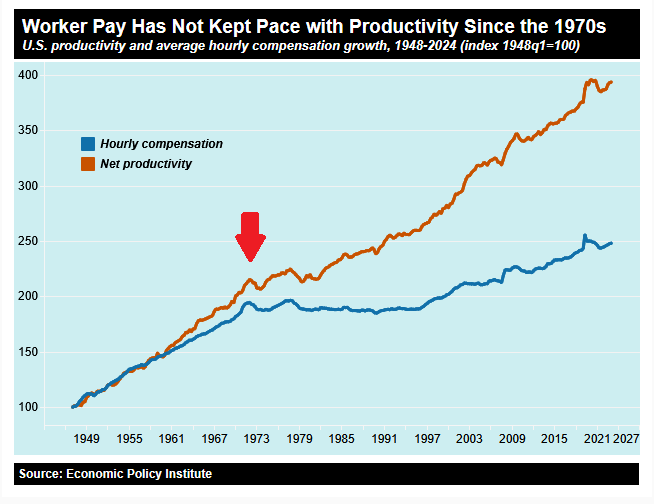
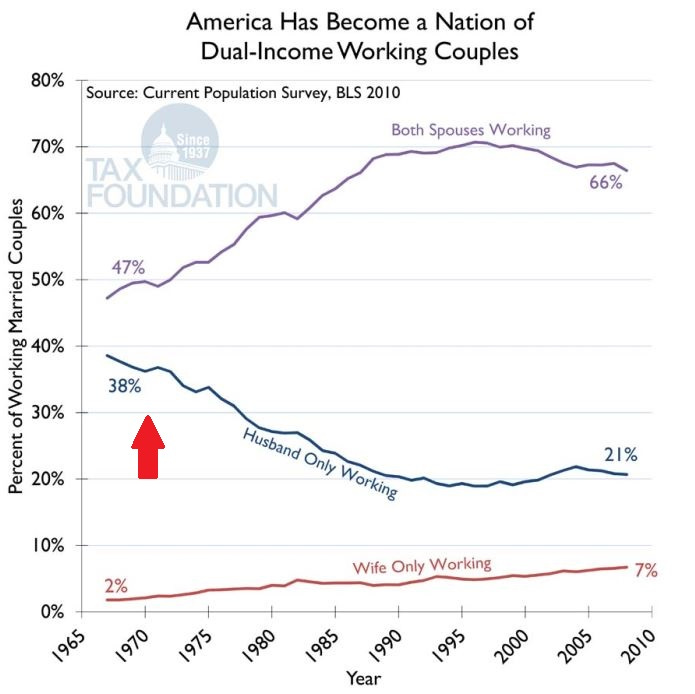
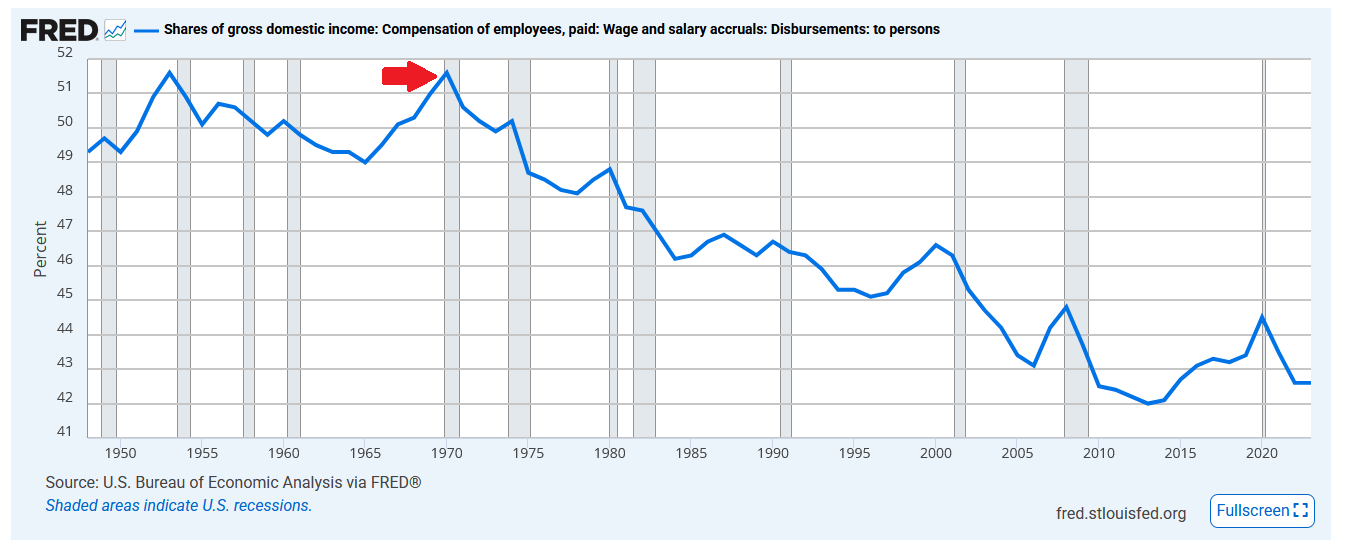

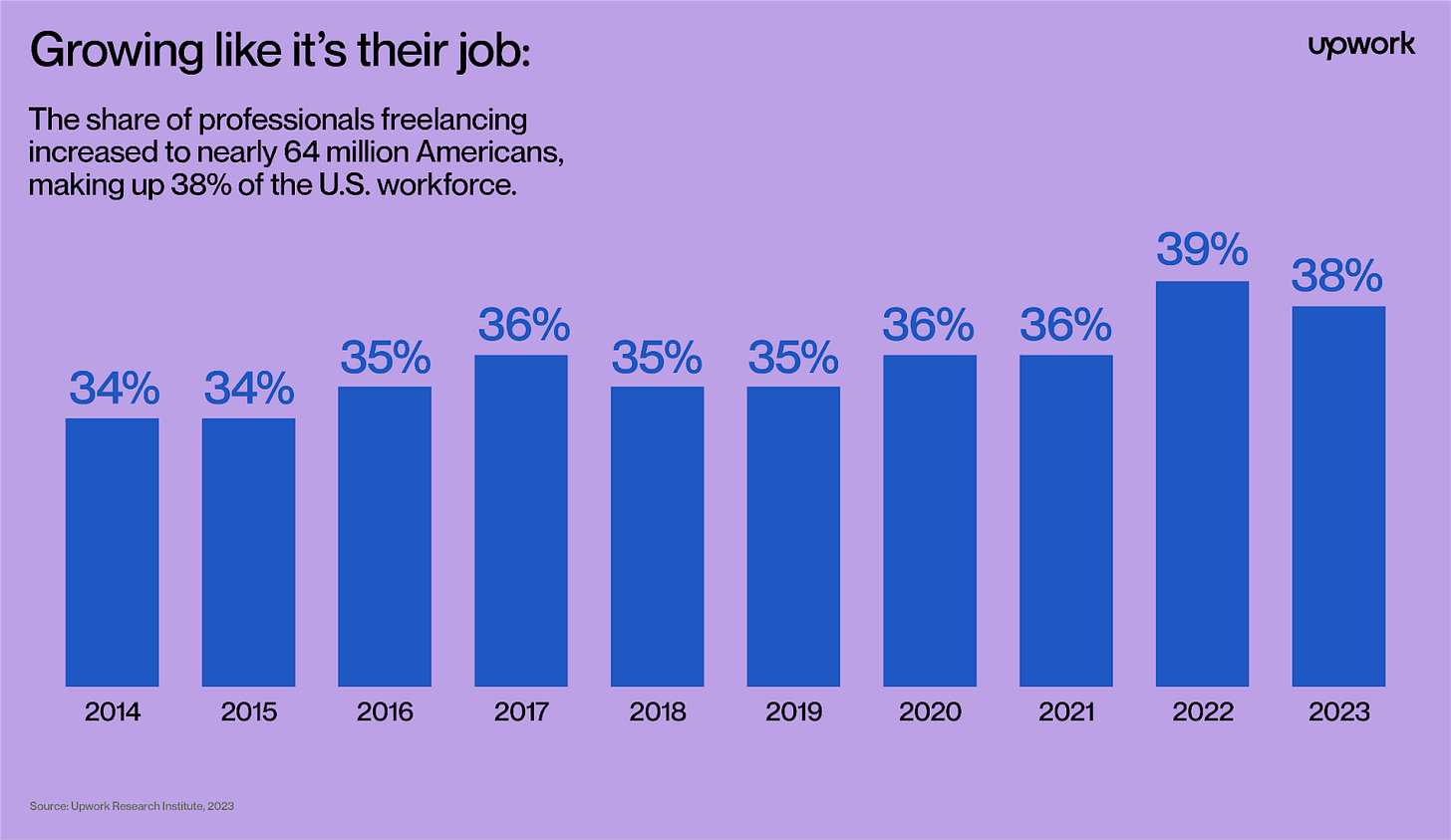
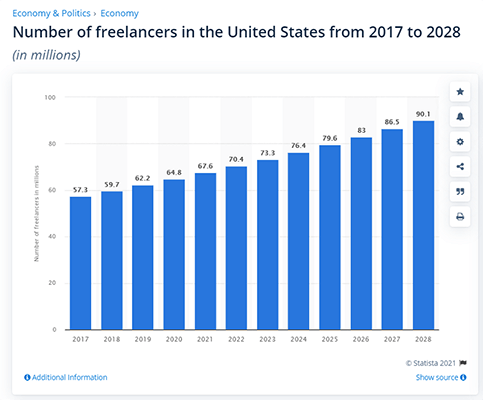
So much here and so much more should we continue to dig in.
Health insurance was a brilliant way to create employee loyalty. And became a tool for dependence as healthcare costs have risen to insane heights over time.
People can't even change jobs sometimes because it takes 90 days to even be eligible for benefits.
We've enabled a system that keeps us down. A societal Stockholm-Munchausen Syndrome.
Shortly before COVID, I shared the idea of micro jobs with friends. It's essentially the project-based entrepreneurship you describe.
A method for breaking out of the monogamous employer relationship that keeps us playing small and dependent.
And also a truer expression of our fullness as humans. No person I know can be narrowed down to a single job title or description.
We contain multitudes. Let's let our participation in the economy reflect that.
It's shameful to think that a significant minority of us need side hustles to live well, but that can be used to create an advantage. Learning and earning while continuing to receive an employee wage, addingore skills and projects until leaping away one day.
Largely, employers operate as if they don't owe anyone anything. It's okay to relate similarly to them.
Human interdependence over one-sided dependence.
That's right, generalists are often better prepared for the shift toward independence and interdependence. Their ability to connect dots across disciplines and adapt quickly gives them a resilience many specialists struggle to find.
I’ve seen multiple case studies where being laid off (as painful as it was) became the catalyst for people to reclaim agency, rediscover their strengths, and design work that actually fits them.
If dependence culture trained us to play small, generalists are the ones most equipped to break that spell. Even if you aren’t a generalist though, leaning into breadth, perspective, and adaptability will be what helps you thrive in what comes next.